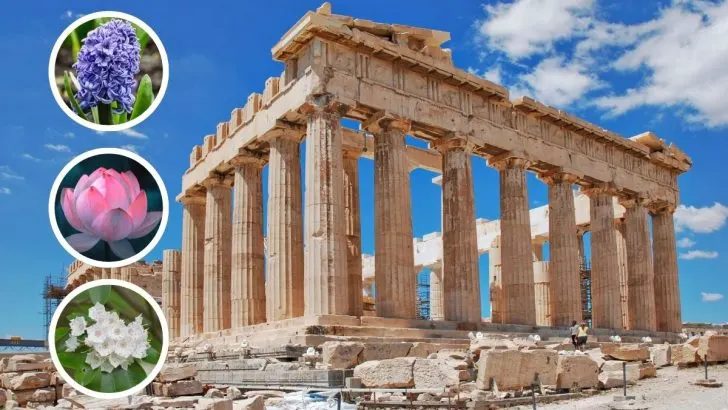In today’s article, we will talk about the flowers in greek mythology. If you love myths, mythology, and stories about Greek Gods and Goddesses, you’ll enjoy this article as well.
From Ancient Greece and Ancient Rome all the way to the middle ages, and even now in modern ages, flowers have such powerful meanings.
They have their own image of the world and beyond a great look and medicinal properties, they can symbolize unrequited love, sadness, hope, jealousy, and much more.
But in Greece, Gods apparently knew what each beautiful flower means and they brought much symbolism to flowers themselves.
Let’s learn then what a magic mirror of flower souls is present in Greek mythology and today.
Flowers In Greek Mythology
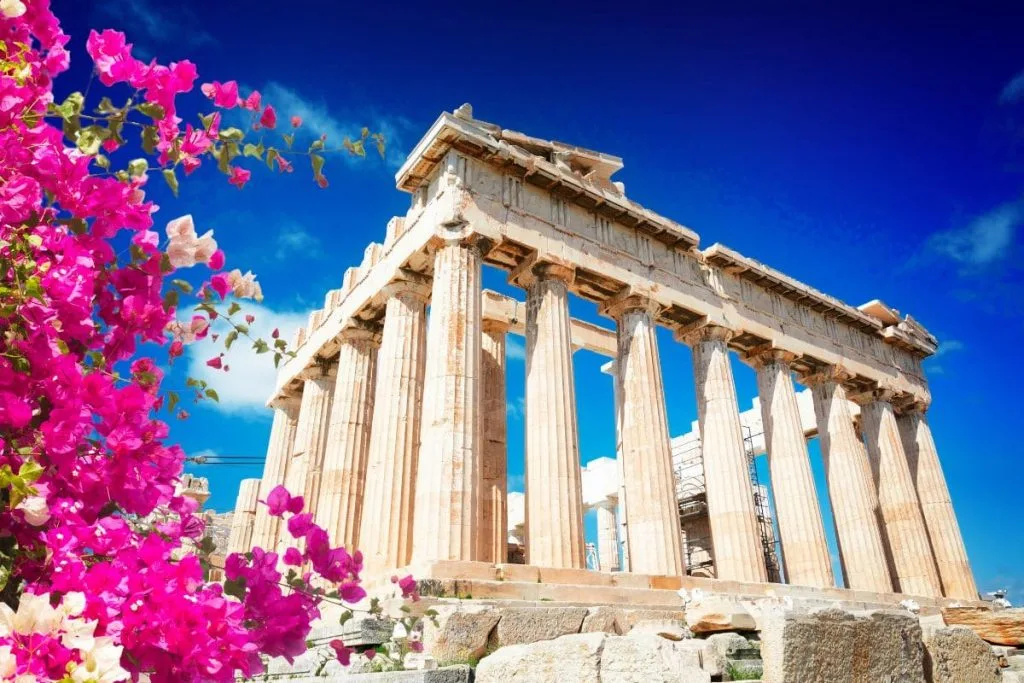
Ancient Greeks were truly connected with nature. They were also careful with it and believed that you could even spot your own reflection in the wild if you know where to look.
If you see a greek myth, it is most likely that greek mythology links with flowers or love. Greek words carry many mysteries upon them and once you rival greek myth, it’s a truly magical thing.
Greek gods, especially the sun God Helios, the ancient greek hero Odysseus, the goddess aphrodite, and basically, all the gods were connected with nature and flowers.
Zephyrus, the God of the west wind believed that you could see your own destiny in the way the flowers speak in nature. If you listen to them, as you feel and listen to the wind, you might be able to hear your destiny.
Below, we will talk more about flowers in greek mythology and how the Gods and Goddesses saw flowers in their own time.
15 Greek Mythology Flowers According To Greek God(s)
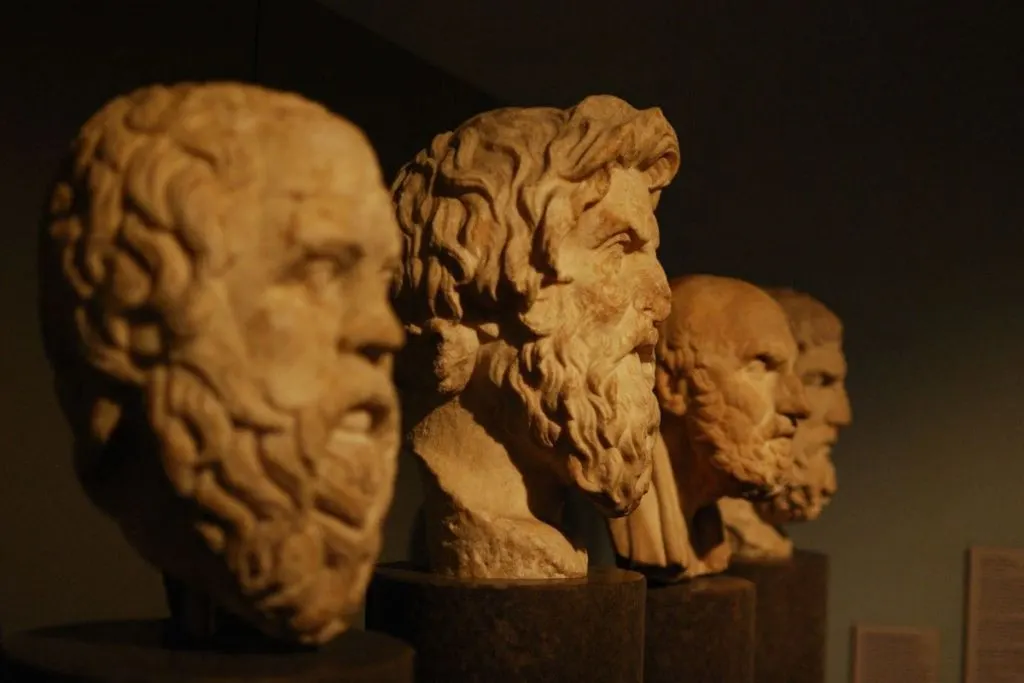
Greek gods responded to nature’s calls. Usually, greek myths describing and greek mythology tells how Gods used to climb on the high mountains to listen to flowers talk.
They used to believe that within the north wind on the mountains, they carry what flowers speak as well. As higher as you go, and as stronger the wind gets, you’ll be able to understand and hear flowers speak more.
This was also common in roman mythology. Some greek women and other greek gods believed that you can hear flowers speaking only in their blooming season. When the flower is about to open, that is when you’ll hear its true traditional floral symbol.
Let’s see then what the ancient greek word δελφίνιον presents, what yellow flowers and blue flowers mean in greek mythology.
1. Crocus Flower In Greek Mythology
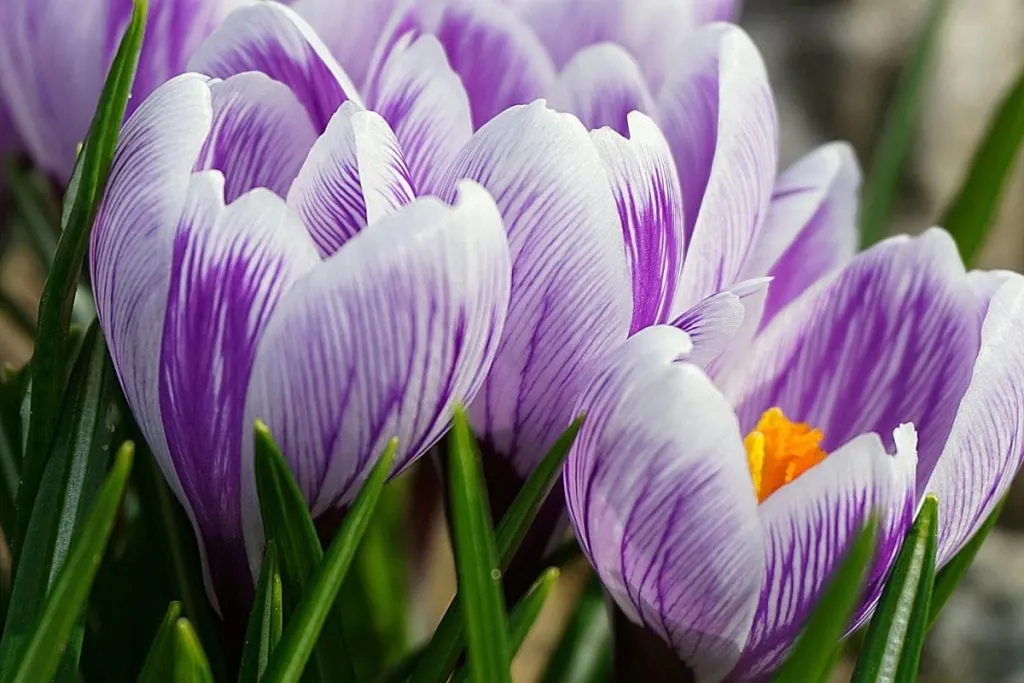
There are many myths about these flowers, but we’re focusing on what the alternative myth describes. Crocus was a lover of the god Hermes.
As usually happens in Greece, there were many competitions and games, some of which would often end fatally. By a combination of circumstances, Hermes and Crocus found themselves in such a duel.
The rules of the game are clear, so the two of them had to fight against each other even though they didn’t want to.
At one point, as the game drew to a close. Hermes forgot who his “adversary” was under the shield and armor and brushed him with his sword.
The kitten was sharp though and managed to break through the shield and find its way to the hide and kill Crocus.
The moment Hermes screamed realizing what he had done, his lover’s body turned into a Crocus flower.
2. Narcissus Flowers In Greek Mythology
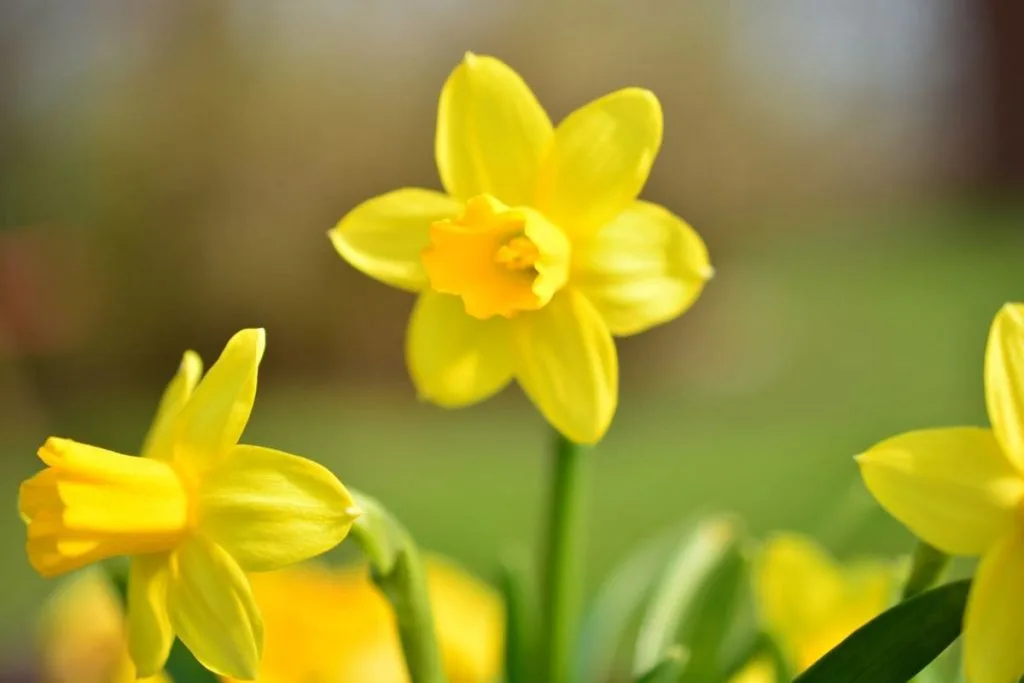
There are many legends about the origin of the narcissus flower, but only one myth is truly the true one.
There was a Greek God who loved his reflection in the mirror very much. If he didn’t have a mirror nearby, he looked for the fastest way to see himself.
So one day he found himself in nature and hurried to find a source of water in order to see himself as soon as possible.
After a few minutes of walking, he came across a small lake. He bent down, knelt on his knees, and began to look at his reflection in the lake with satisfaction.
However, engrossed in his beauty, he forgot that he was near the water and plunged his whole body into the lake. As he did not know how to swim, the young God suffocated in that lake.
A narcissus flower grew at the place of the pore of the river where he fell. That is a story of a greek figure named narcissus.
3. Hyacinth Flowers In Greek Mythology
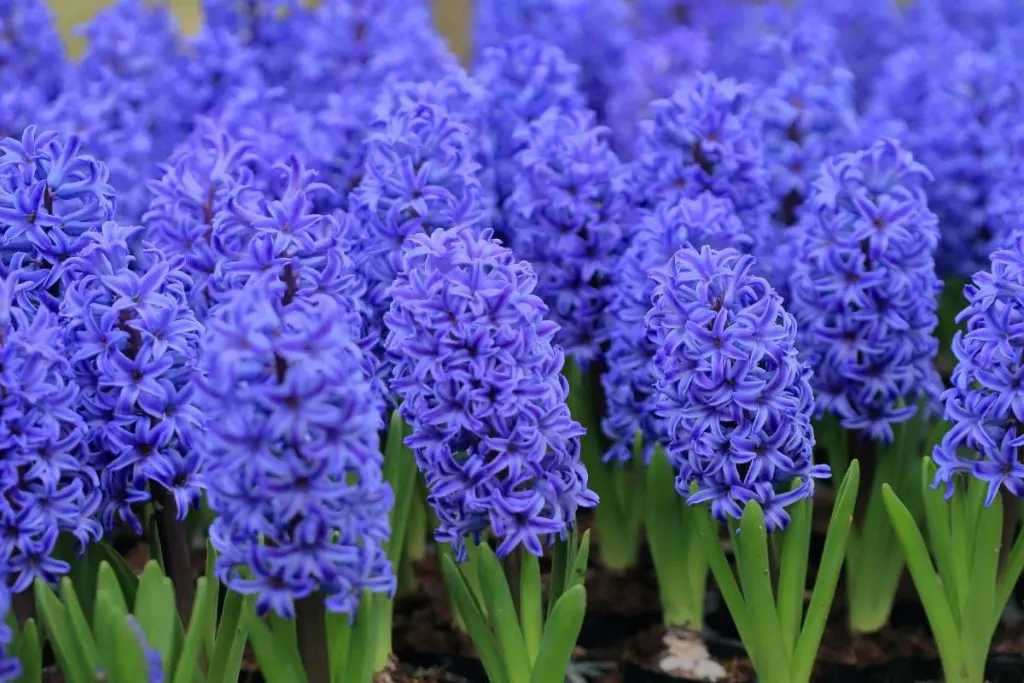
Apollo the sun God had a lover. They loved each other more than anything in the world and swore they would never love anyone else. His lover did everything to impress Apollo. But even the greatest love experiences tragedy, and that’s how this one ended.
Apollo’s lover fell ill. He carefully cared for him during the days, was by his side at night, sang to him, and caressed him. But even the greatest love could not heal his mortal lover.
After long and difficult months, in their favorite place in the forest, Apollo’s lover died. The lover’s name was Hyacinth.
Apollo, sad and crying, asked the God of nature to make Hyacinth flowers grow in that place in the forest. And it was like that.
God fulfilled his wish and beautiful Hyacinth flowers grew in the place where his lover had planted them. He often went there to make flower bouquets to remind himself of great love.
4. Lotus Flowers In Greek Mythology

Greek women, and especially Greek goddesses, believed that the lotus flower brings strength and purity to life.
Therefore, before giving birth to a son or daughter, they took lotus flowers and placed them above their heads during childbirth to ensure that their child would be pure and strong.
Some were also lotus eaters and while eating lotus, they would sit naked. If a female child was born, purity was a quality she had to have, and a man, especially a Greek God, had to be strong in order to proudly carry his future titles.
For this reason, for the Greeks, the lotus flower means triumph after struggling a lot against failure. In this sense, it symbolizes purity after the war and the period of peace between the warring countries.
The story of the lotus also mentions the Trojan War. Allegedly, after the Trojan War, the lotus sprouted on the surface of every stream and lake near which this war was fought.
5. Laurel Tree
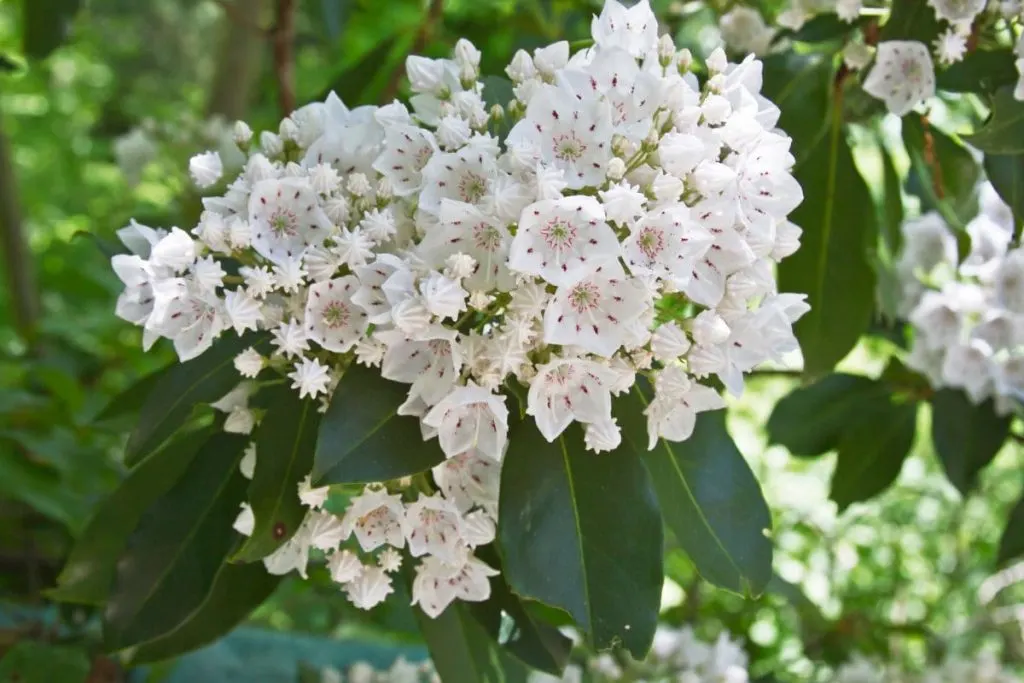
The god Apollo loved Daphne, but she never showed any interest in him. However, he did not want to admit it and pursued her.
One day he started hunting while she was walking alone in the forest. Daphne got tired of running and started calling her father who turned her into a laurel tree. But even then, Apollo didn’t stop chasing Daphne.
He began to make wreaths from the laurel tree and began to adorn himself with them. So he finally managed to tell everyone how he had won over Daphne after all.
What do you think is the national flower of Greece?
6. Iris Flower
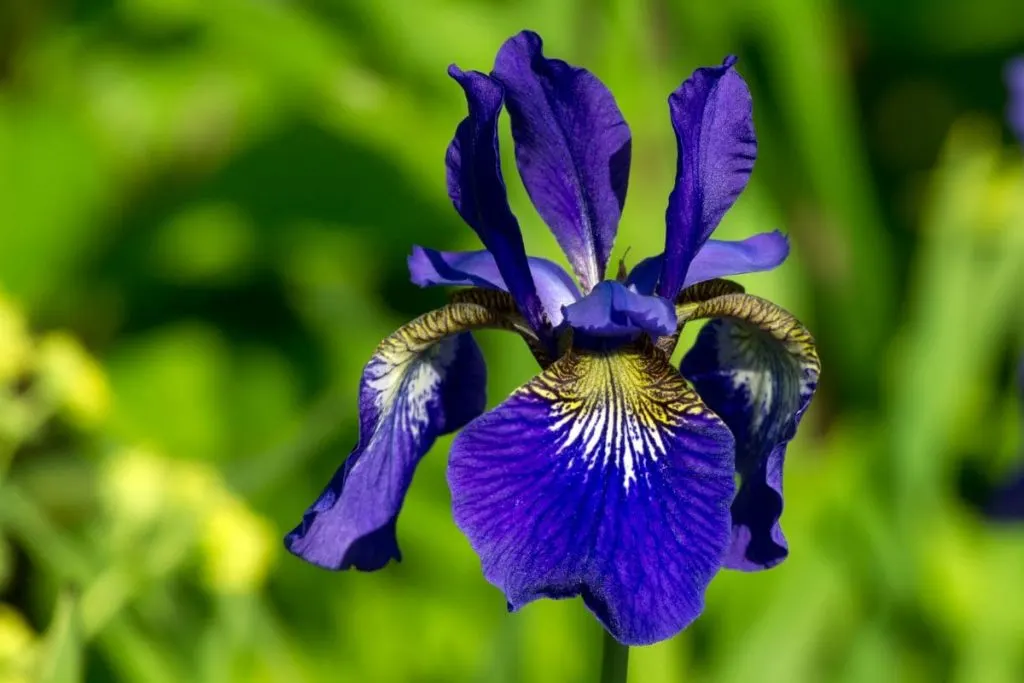
There are several versions of the Iris flower in Greek mythology. The first says that Iris was the goddess of the rainbow. The iris flower exists and grows in many colors and is therefore called the Goddess of the Rainbow.
Another version says that the iris flower is the consort of Zephyrus, the god of the west wind. She was the iris flower after death, and her mother the pothos after death. Today, this flower symbolizes faith, love, hope, and admiration.
Another version says that the flower originated near a water nymph lake. In that lake, her Greek water nymphs bathed every day, and after their death, an iris flower sprouted nearby.
7. Wolf’s Bane
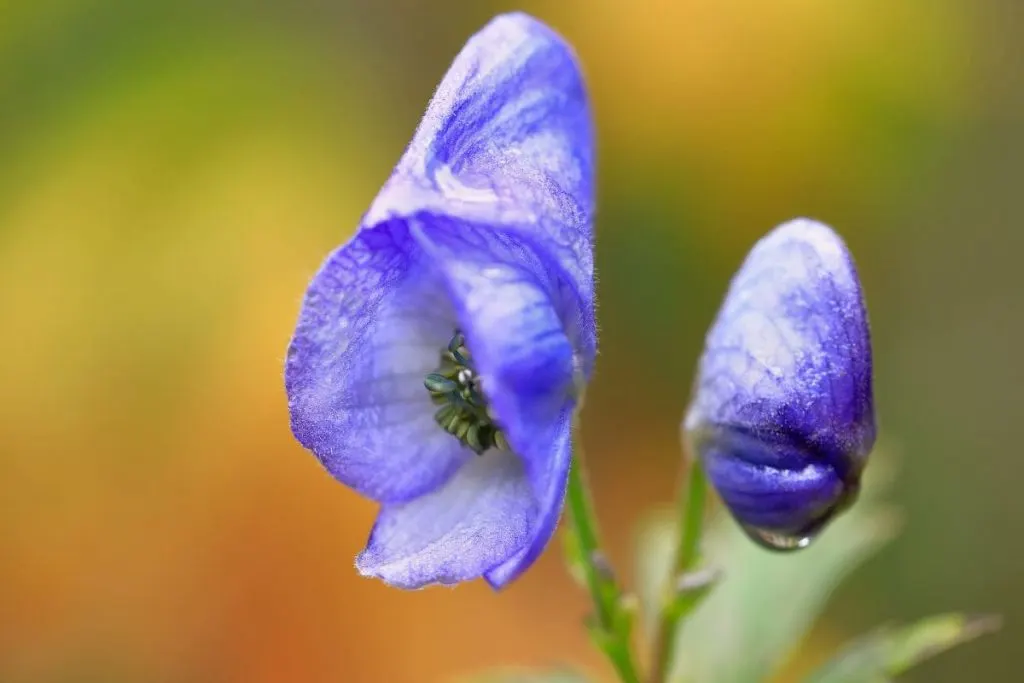
The Greek name lycoctonum actually means wolf’s bane. In Greek mythology, this flower smoothed the tip of arrows and weapons used to kill wolves.
In this flower, there is something, according to mythology, very poisonous that does not suit wolves at all.
When the juice of this flower comes into contact with the wolf’s blood, it kills it on the spot. In ancient Greece, all Greek hunters used this trick.
8. Pomegranate
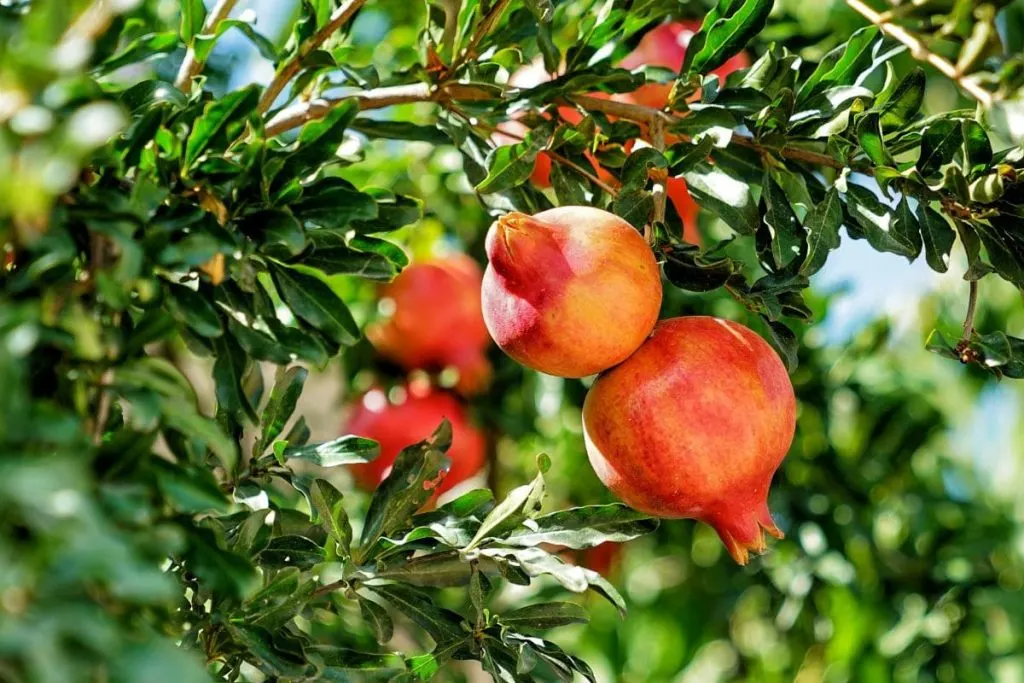
Since ancient times, it has been claimed that it is the fruit of the gods. Many peoples and cultures saw different benefits in the pomegranate and attributed it with special powers.
From the ability to restore youth, over a longer life to connecting this world and the next. For the ancient Greeks, it was a symbol of marriage.
It was also a symbol of fertility and hope for a new life for them, who buried their dead with pomegranate fruits.
In Greek mythology, pomegranates are also associated with Aphrodite, the goddess of beauty, and Hera, the goddess of marriage and childbirth.
Even today, the pomegranate and pomegranate seeds are a symbol of abundance, fertility, happiness, and progress for the Greeks.
It is traditionally brought into a new home and given as a gift and is present at weddings and New Year’s celebrations.
9. Red Roses
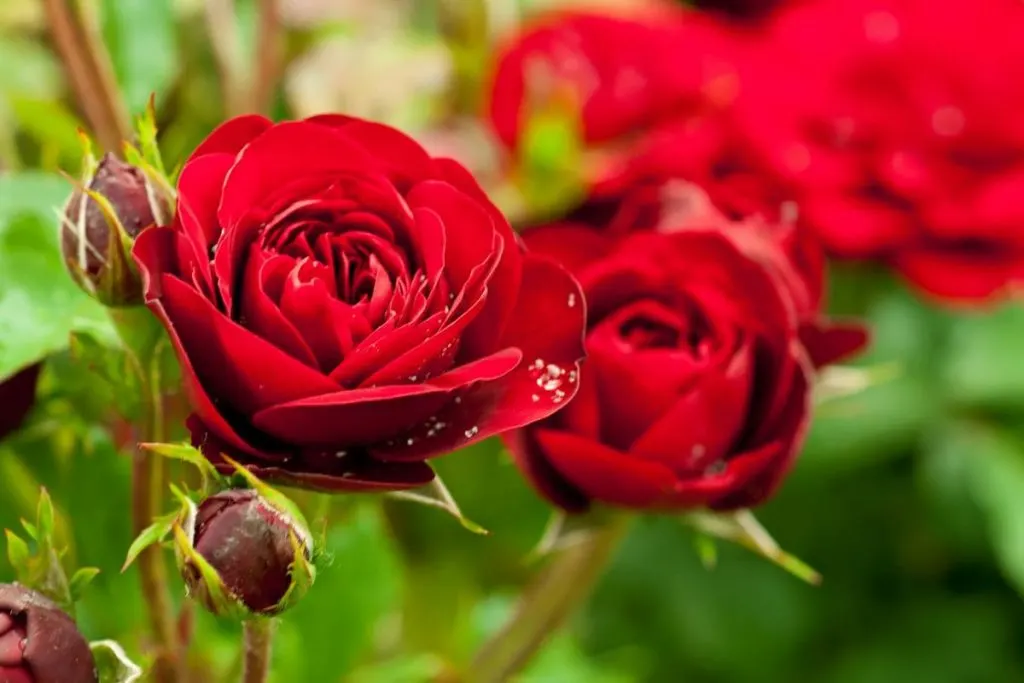
It’s believed that in the fight between incredibly handsome spartan prince Hyacinthus and Apollo, Apollo had the wild boar.
Wild boar was the wild and fierce animal who served only brave, fearless men, Apollo was one of them.
Apollo noticed that he might not have a chance against Hyacinthus in a fight. Even though Hyacinthus chose Apollo as his rival, the greek figure of Apollo was too much for him.
Angry Apollo wanted to win the fight badly. Apollo incited wild boar into Hyacinthus and wild boar wounded him. When angry Apollo got closer, he saw a miracle. Where his blood dropped on the floor, that place, red roses arose.
10. Adonis
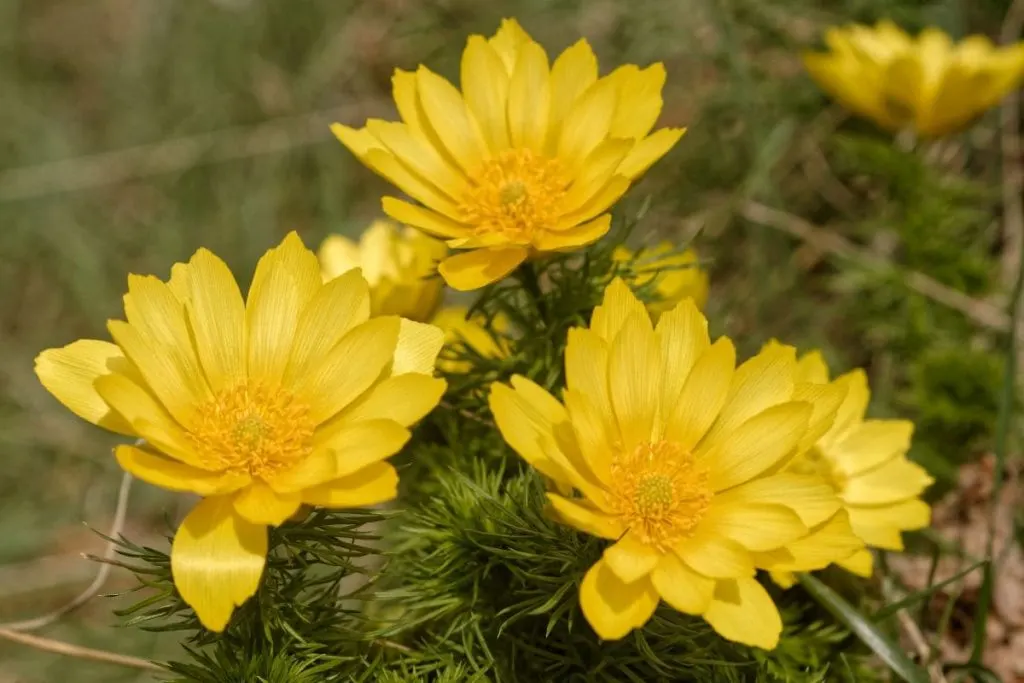
Adonis’ drops of blood served as the appearance of another flower endowed with healing properties. It’s called “Adonis”.
Actually, it’s a wild poppy with bright red, literally flaming petals against the background of green meadows, as if everything resembles drops of Adonis’ blood.
It is no coincidence that the ancient Greeks considered the red poppy to be a symbol of the power of the fire of love, as well as peace of mind, sleep, and oblivion of eternity.
11. Anemone
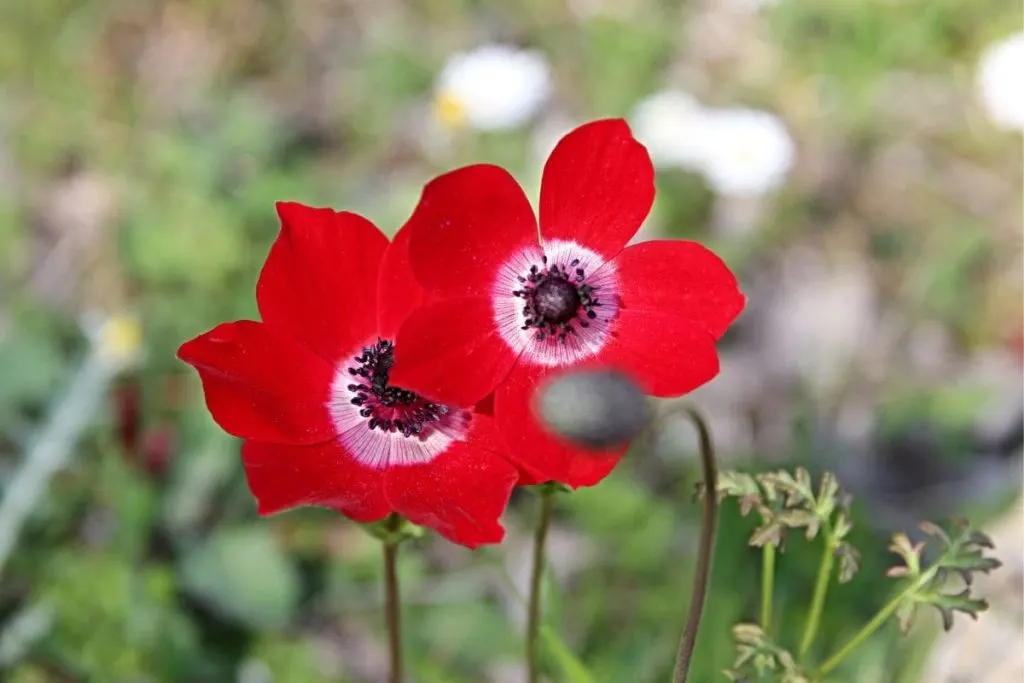
The name of the flower is connected with the love story of Adonis and Aphrodite. According to the myth, once Adonis went to the forest to hunt, where, however, Aphrodite’s former lover, the god of war Ares, was waiting for him, who was incredibly jealous of Aphrodite for Adonis, because of whose beautiful eyes she left him.
Aris turned into a wild boar and attacked Adonis, mortally wounding him. Aphrodite, hearing Adonis’ moan, rushes to look for him. But it was already too late.
A disconsolate Aphrodite embraced the lifeless body of her beloved, spraying the wound with nectar. An incredibly beautiful flower appeared from blood mixed with nectar.
But the life of this flower turned out to be rather short: with the breath of the wind, the flower buds open, while with subsequent blows, its petals scatter in different directions, far, far away … That is why the flower is called “anemone” or “anemoluludo”, that is, “flower wind”.
12. Sunflower

According to the mythology of the ancient Greeks, the Sunflower was created by the goddess of flowers and vegetation, Flora.
Once, Flora found the lifeless body of one of the nymphs, who are distinguished by their extraordinary beauty, in the forest.
Her grief was so great that she turned her already lifeless body into a flower. But that was not the end.
The goddess of flora called for help from the goddess of love Aphrodite and the god of wine Dionysus.
Aphrodite endowed the flower with beauty, and Dionysus supplemented her gift with nectar, for a sweet fragrance.
The wind god Zephyr (the westerly wind that dominated the eastern Mediterranean) dispersed the clouds with his breath, allowing the sun god Apollo to shine with all his might and help the flower bloom.
13. Peony
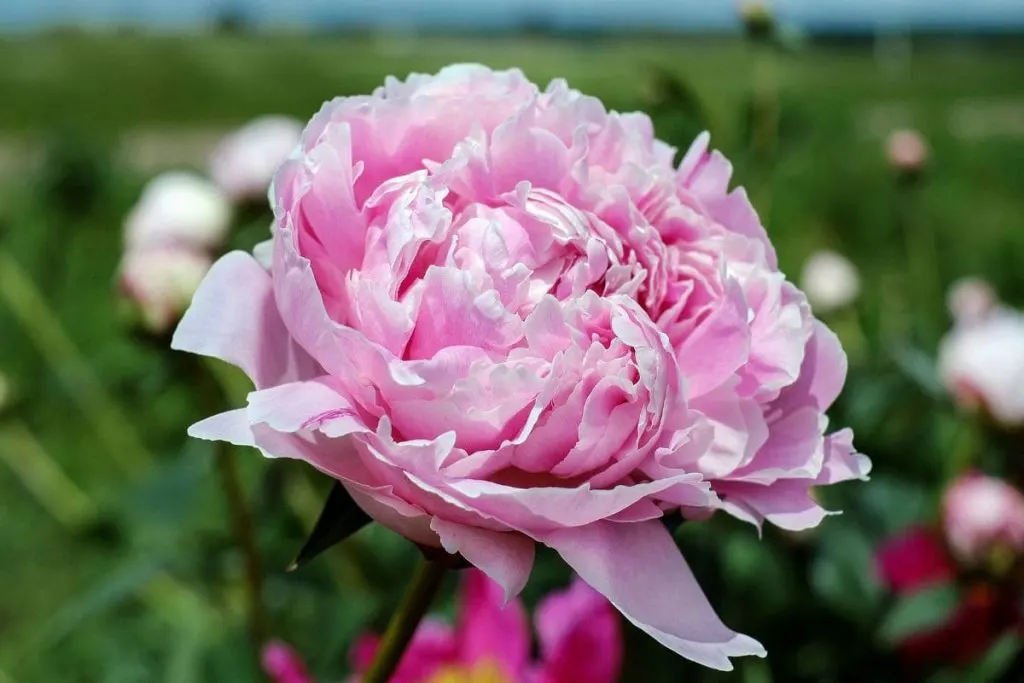
The peony is believed to be named after the deity of healing Peonas, Peon or Penionas, famous, according to Homer, for healing Hades and Ares from injuries.
Peon is treated with medicinal herbs. The myth associated with the peony flower says that Paeon was a student of Asclepius himself, the god of medicine and healing.
One day, Leto – the mother of Apollo and the fertility goddess Artemis – taught him how to obtain a magical root that grows on Olympus, which could ease the pain of women during childbirth.
Asclepius, overcome with envy, tried to kill his student, and then Zeus saved Paeon from Asclepius’ anger, turning him into a peony.
It is important to note that in ancient times the seeds of this flower were indeed used to treat pregnant women.
14. Orchid
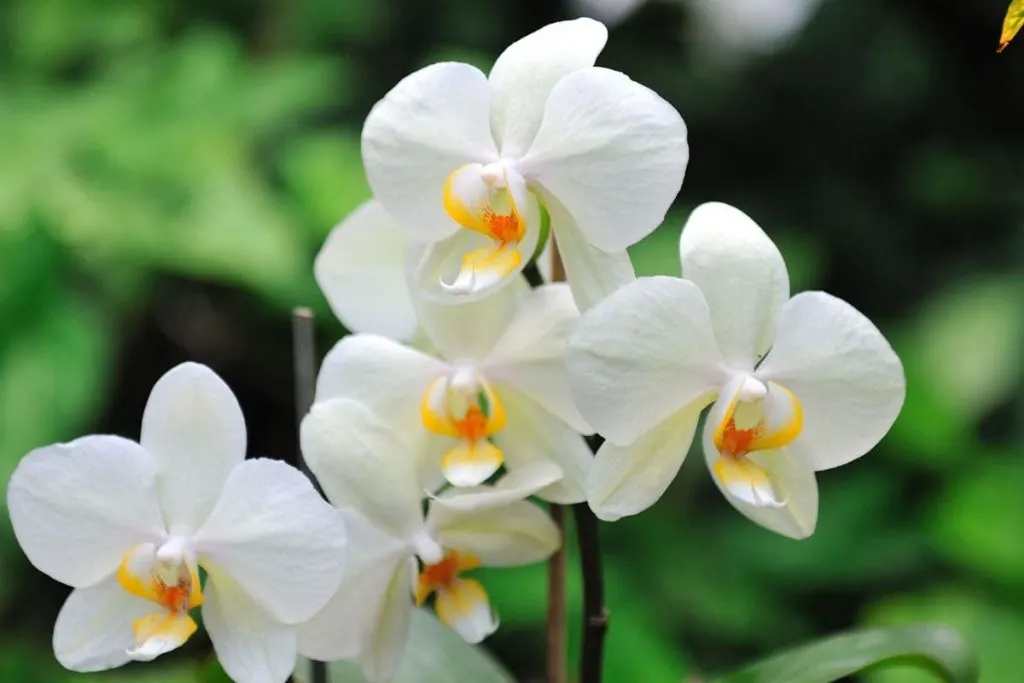
Once upon a time in a faraway kingdom, there was a beautiful boy named Orchis, born of a nymph and a satyr. She had her mother’s beauty, while he had his father’s libido.
One day, while Dionysius was being celebrated, Orchis tried to charm and seduce a priestess, something the god himself had forbidden.
The boy thought he could escape the vengeance of the mighty Moire who punished abuses caused by the desire for omnipotence, but he could not escape him and was torn to pieces by wild beasts.
The gods, however, did not want to allow the memory of the beautiful Orchid to be lost and allowed a plant to be born from its remains.
Flower suddenly budded in two bulbs, precisely the male anatomical appendages that were the cause of the accident. That’s how the first orchid sprouted.
15. Lily Flowers
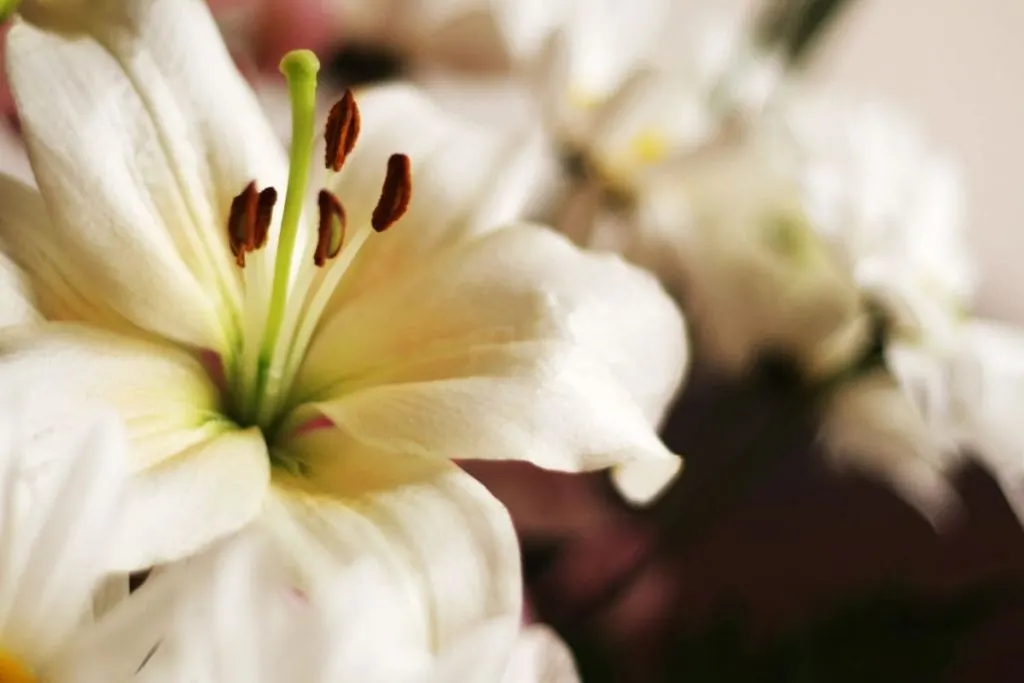
In ancient Greece, it was dedicated to the goddess Hera, queen of heaven and wife of Zeus, protector of marriage and offspring.
Namely, since he was the son of the god Zeus and the mortal woman Alcmene, Zeus wanted to conceive from the breasts of his wife, the goddess Hera, in order to become immortal.
While she was sleeping, they laid him on her breast and when he nursed, a few drops of milk spilled into space, and the Milky Way was formed, and from the drop that fell to Earth, a white lily was formed.
FAQ – Flowers In Greek Mythology

The modern floral sensation is truly nice, but it meant more in ancient Greece. Below we’ll answer the most common questions about this topic. Let’s learn more about flowers in greek mythology.
Who Is The Greek God Of Flowers?
Who Is The Greek Goddess Of Flowers?
What Is Apollo’s Flower?
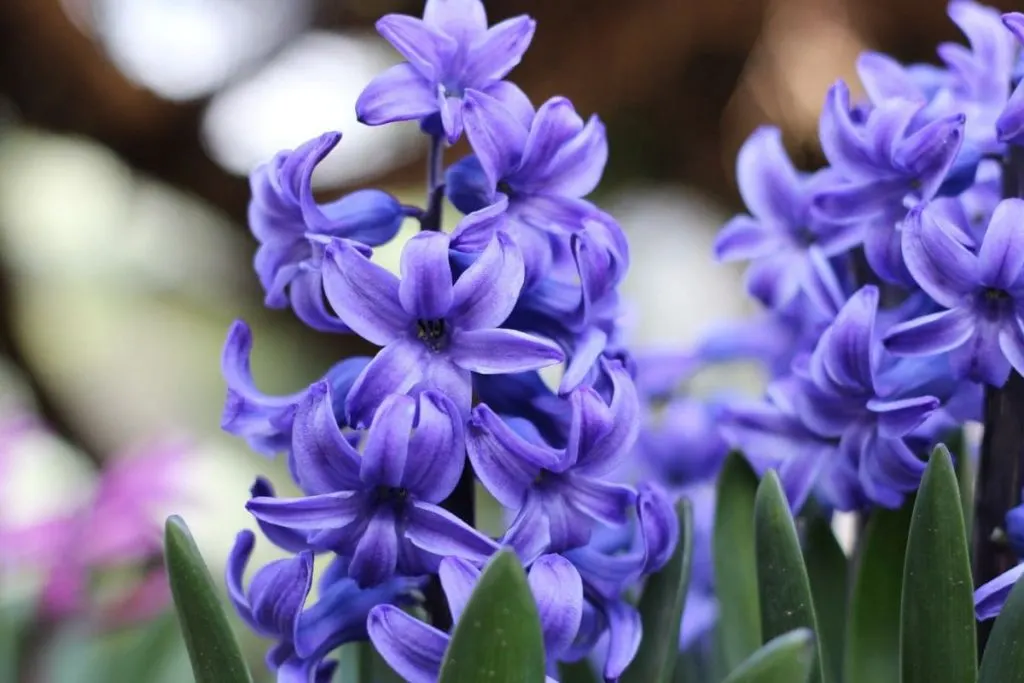
Hyacinth is the flower of love, happiness, fidelity, and sadness. And some call it the flower of Apollo. The name of the flower “hyacinth” means “rain flower” in Greek, but the Greeks at the same time called it the flower of sorrow and the flower of remembrance of the hyacinth.
There is a Greek legend associated with the name of this plant. In ancient Sparta, Hyacinth was for a time one of the most important gods, but gradually his fame faded and his place in mythology was taken by the god of beauty and the sun, Phoebus or Apollo.
The legend of Hyacinth and Apollo is one of the most famous stories about the origin of flowers. In Greece, the hyacinth was considered a symbol of the death and resurrection of nature.
On the famous throne of Apollo in the city of Amyklius, the procession of Hyacinth to Olympus is shown; according to legend, the base of the statue of Apollo, sitting on the throne, is the altar where the deceased young man was buried.
What Is Aprodhite’s Flower?
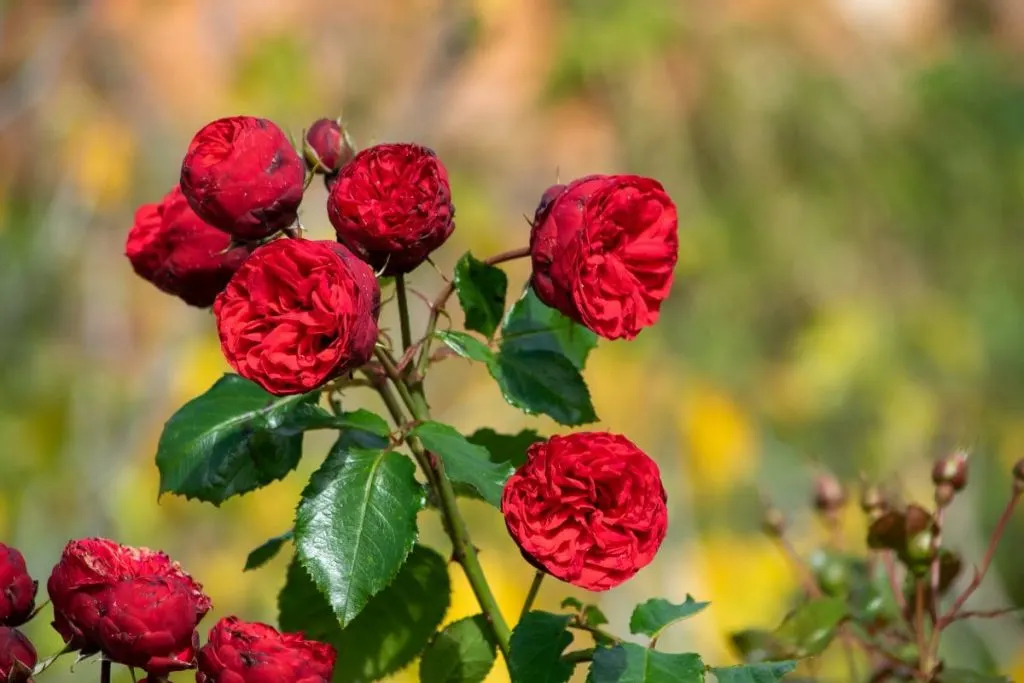
The goddess Aphrodite was married to Hephaestus. On one occasion, before he went hunting, the goddess Aphrodite begged him to give up hunting because she had some kind of strange premonition. But he didn’t listen to her and went hunting.
During the hunt, a tragedy occurred when Aphrodite’s lover was killed in an attack by a wild boar. When the sad news reached Aphrodite, she frantically ran barefoot on the stones, on which occasion she dug up her bare feet so that drops of blood remained on the stones.
When she finally reached the scene of the tragedy, she took the body of her lover and brought it before the supreme deity Zeus and begged him to bring him back to life.
Since it was not appropriate for a goddess to associate with a worldly creature, Zeus could not grant her request. But since he saw how much Aphrodite suffered for that person, Zeus decided that he would revive her lover every year for a period of three months, during which period Aphrodite and her lover would be together.
As proof of their love, every drop of Aphrodite’s blood would grow a flower that has not yet grown on earth. That flower was the Red Rose, which thus became a symbol of love.
Final Thoughts On Flowers In Greek Mythology

No matter what flowers we talked about, Jupiter’s flower, golden apples, red anemone flower, or dolphin-shaped flowers, there are great stories within these flowers.
They used to make people feel murderous jealousy-fueled rage and they’re now one of the most popular ancient flowers.
Flowers in greek mythology are not like modern flowers. Their meanings are deeper and more meaningful and they carry many stories upon them.
Hope you enjoyed today’s article, see you soon with similar topics!

